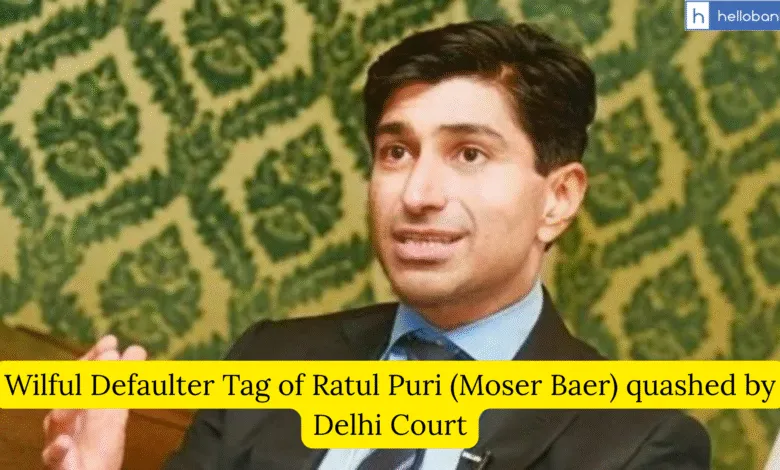Wilful Defaulter Tag of Ratul Puri (Moser Baer) quashed by Delhi Court

The Delhi High Court has set aside the classification of Ratul Puri along with his mother Nita Puri, as “wilful defaulters” under the Reserve Bank of India’s Master Circular. He is former director of Moser Baer India Ltd (MBIL) and Moser Baer Solar Ltd (MBSL).
Moser Baer India Ltd availed loans from various banks. These included a loan from BOB, which was sanctioned vide letters dated 12 December 2006 and 24 April 2010. At the time of availing of the loan, the respondent Ratul Puri was a whole-time director of MBIL. In 2010, he decided to exit from MBIL, though he continued to remain a director on its board.
Bank of Baroda (BoB) and Punjab National Bank (PNB) filed an appeal to declare him as wilful defaulters. Now, Court has said that the banks had failed to provide verified and objective proof that borrowed funds had been intentionally diverted or misused.
The Court said that if there is no proof that the company misused money taken as a loan, then it cannot be called a “wilful defaulter” under RBI rules. In 2012–13, MBIL and MBSL were put under the Corporate Debt Restructuring scheme because of financial problems, and at that time, banks had agreed that the money invested in their subsidiary companies came from the company’s own earnings, private investors, and foreign bonds—not from bank loans.
The Court said that many years after the restructuring, banks used forensic audit reports (FARs) to label the companies as wilful defaulters, even though those same reports admitted they had not verified where the investment money actually came from. The Court said such reports could not be trusted and that facts accepted during the earlier restructuring process could not later be twisted into allegations of wrongdoing unless there was fresh, solid evidence.
The banks also tried to argue on other points, like interest-free deposits and internal lease deals, but the Court rejected these too, saying they were normal business decisions and had already been shared with the lenders before.
The Court stressed that being called a wilful defaulter has very serious consequences—it can ruin a company’s reputation, block it from getting loans, and even lead to legal action. It made clear that just because a company fails to repay doesn’t mean it is wilfully defaulting.
The label should only be used when there is strong, clear proof. Since no such proof was found, the Court upheld the earlier Single Judge’s decision and dismissed all the banks’ appeals without imposing any costs.
Download Court Order PDF (This Report is available for Premium Users Only. Click here to join premium)
